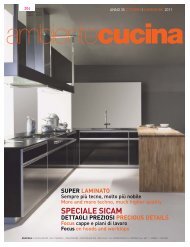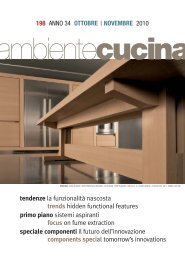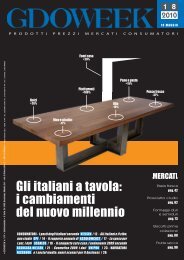You also want an ePaper? Increase the reach of your titles
YUMPU automatically turns print PDFs into web optimized ePapers that Google loves.
Un’altra figura del sistema contract è il general contractor che esiste per<br />
coordinare tutti gli attori e può essere affiancato dalle procurement company<br />
e dal cost controller che dipende dall’owner e operator.<br />
Elenca infine i comparti del contract: ospitality (aeroporti, stazioni), commercial<br />
(ristoranti, bar, negozi, centri commerciali), business (uffici, banche),<br />
teatri, musei, poi ci sono le università, le pubbliche amministrazioni, il<br />
settore navale e il settore ospedaliero che per ora è poco considerato ma<br />
potrebbe essere una possibilità per il futuro.<br />
Marco Piva porta la sua esperienza nel settore contract. In questo<br />
sistema Piva si considera una sub sub particella dei pochi che progettano<br />
in modo sensato e su un panorama esteso. Descrive il suo<br />
studio e la sua attività che offre ai propri clienti l’italian style, fatto di<br />
classe, materiali adeguati e di livello, atmosfere.<br />
A suo parere si deve metter più intelligenza nel processo e prodotto,<br />
porre attenzione ai materiali, non sprecare, cercare di innovare,<br />
fare indagine e sviluppo con grande attenzione: le cose fatte meglio,<br />
che pesano meno e durano di<br />
più, funzionano bene nei territori del<br />
progetto. Per essere competitivi bisogna<br />
indagare come usare i materiali;<br />
la cultura del prodotto in Italia nasce<br />
da legno, marmo, ceramica che possono<br />
essere reinventati per migliorare<br />
sempre la qualità del prodotto.<br />
L’obiettivo deve essere quello di essere<br />
sempre più avanti degli altri.<br />
Diego Travan, di Interna, impresa contract, afferma che secoli di storia,<br />
arte, inventiva, ci hanno regalato una posizione di rilievo nel mondo<br />
del mobile, siamo i primi della classe, abbiamo ereditato inventiva<br />
e capacità manifatturiere.<br />
Per quanto riguarda il contract nello specifico, si chiede se si può vivere<br />
di rendita: oggi non è più possibile, la globalizzazione lo impedisce,<br />
si rischia un declino nel contract italiano.<br />
L’Italia ha un serio problema di declino, e così anche nel contract.<br />
Siamo dei player di secondo rango quindi nel contract dobbiamo abituarci<br />
a giocare sempre fuori casa. Le aziende italiane non fanno fatturati<br />
enormi, quindi non hanno molto da re investire. Bisogna cercare<br />
know how in altri settori di imprese.<br />
Oggi bisogna decidere cos’è che possiamo fare per stare nella competizione<br />
globale, se un altro può realizzare lo stesso prodotto che io vendo<br />
a cento vendendolo a trenta, dovrò cominciare a specializzarmi per<br />
sopravvivere, perfezionare il talento su prodotti che altri non riescono<br />
a fare. Oggi nel contract molti si battono solo sul prezzo ed è sbagliato,<br />
bisogna puntare sui materiali, sulla qualità e sull’unicità.<br />
<strong>Il</strong> nostro paese deve rivalutare la capacità manifatturiera, incentivare<br />
gli studi tecnici e non fare protezionismo. Molto importante è anche<br />
delocalizzare portando avanti comunque i nostri valori. Queste sono<br />
le sfide principali del contract secondo Travan. Servono coraggio, investimenti,<br />
capacità manageriali, predisposizioni al rischio, studio, lavoro.<br />
Sono tutti elementi tipici italiani, per questo possiamo farcela.<br />
68 5<br />
2011<br />
Another figure in the contract system is that of the general contractor, who<br />
exists to coordinate all the protagonists and can be flanked by the procurement<br />
companies and the cost controller, who reports to the owner and operator.<br />
Finally, she listed the contract compartments: hospitality (airports, stations), commercial<br />
(restaurants, bars, shops, commercial centres), business (offices, banks),<br />
theatres and museums, followed by universities, public authorities, naval and<br />
hospital sectors. The latter has currently received little attention but could constitute<br />
a possibility for the future.<br />
Marco Piva brings his vast experience to the contract sector. Within this<br />
system Piva considers himself a sub sub particle of the few persons who design<br />
in an intelligent manner and over an extensive panorama. He described his<br />
studio and his activity, which offers his customers Italian style, embodying class,<br />
high quality and appropriate materials and atmospheres.<br />
In his opinion, it is necessary to commit more intelligence to the process<br />
and product, focus attention on materials, avoid waste, try to innovate,<br />
carry out research and development with great attention. Things that are<br />
done well, that weigh less and last longer,<br />
function well in project territories. To be<br />
competitive it is necessary to carry out<br />
research on how to use materials. The<br />
culture of product excellence in Italy<br />
arose from wood, marble and ceramics<br />
- which can be reinvented to further<br />
improve product quality. The goal is clear<br />
and simple: to always be further ahead<br />
than the others.<br />
Diego Travan, of Interna, a contract business, declared that centuries of history,<br />
art and creativity have provided us with a leading position in the world of<br />
furniture. We are the first in the class, and we have inherited manufacturing<br />
creativity and ability. More specifically, as regards the contract sector, he asked<br />
whether one can merely live off revenue: today it is no longer possible, globalisation<br />
prevents it, and to do so would mean risking a further decline in the Italian<br />
contract sector.<br />
Italy is experiencing a serious problem of decline, and so is the contract sector.<br />
We are second division players and therefore, in the contract sector, we are going<br />
to have to get used to playing ‘away from home’. Italian companies do not<br />
generate enormous turnovers, and therefore they do not have large sums to reinvest.<br />
It is therefore necessary to look for know-how in other business sectors.<br />
Today we have to decide what we can do to keep up with global competition,<br />
whether others can realise the same product that I sell to one hundred by selling<br />
it to thirty customers. I will have to start to specialise in order to survive,<br />
perfect my talent relative to products that others are not able to make. Today,<br />
in the contract sector, many focus solely on price, and this is a mistake. It is<br />
necessary to concentrate on materials, quality and uniqueness. Our country<br />
must re-evaluate its manufacturing capacity, encourage technical research<br />
and put a stop to protectionism. It is also very important to delocalise, while<br />
carrying forward our values. These are the main challenges facing the contract<br />
sector, according to Travan. What is needed is courage, investments,<br />
managerial skills, a willingness to take risks, study and work. These are all<br />
typical Italian virtues, and that is why we can succeed.

















